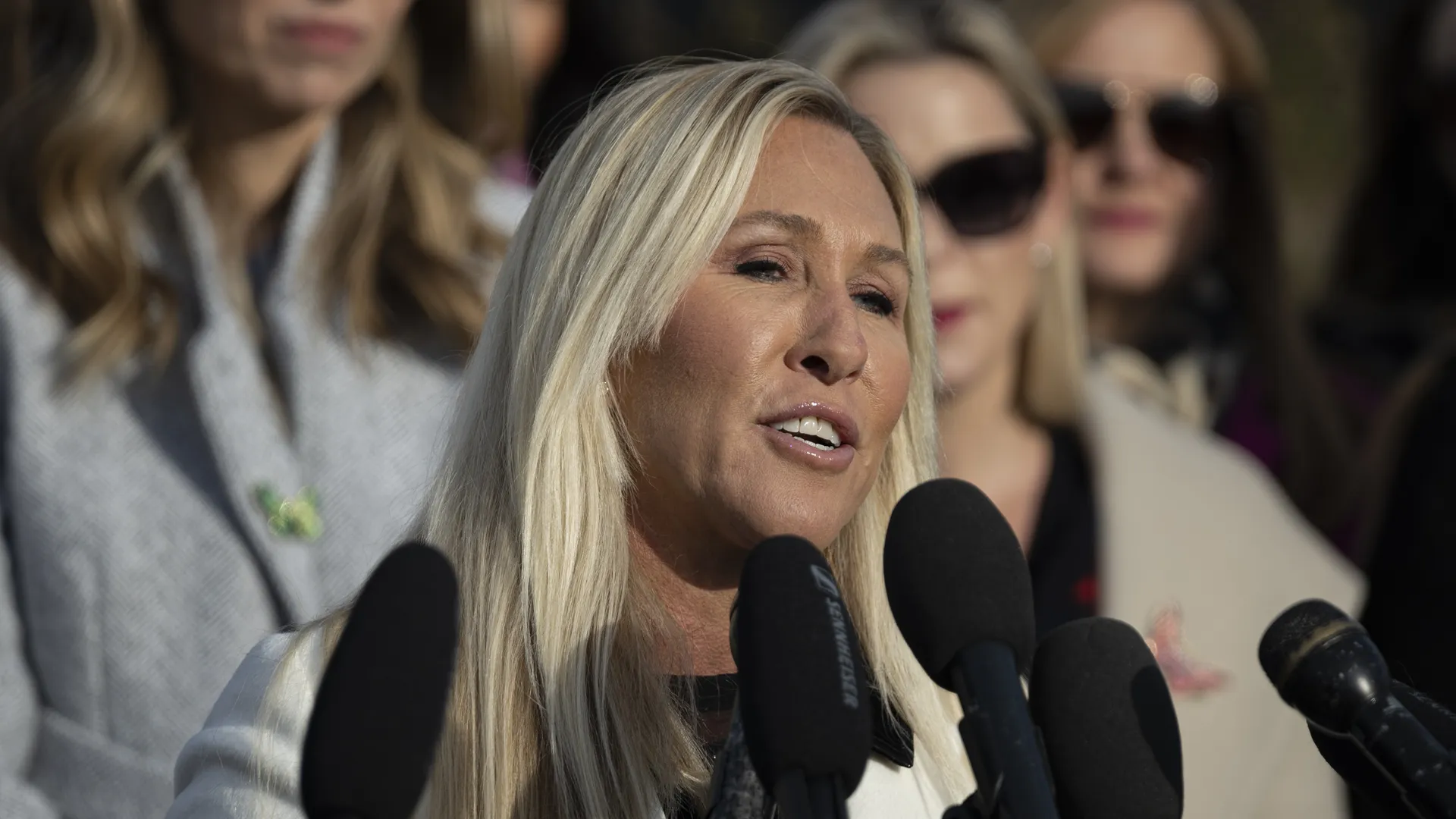Georgia Congresswoman Marjorie Taylor Greene has announced that she will step down from her position in the U.S. House of Representatives next year, ending a tenure marked by controversy, high-profile loyalty to former President Donald Trump, and recent public disputes within her own political faction. Greene’s resignation, delivered in a detailed statement on social media, comes amid a period of significant personal and political reflection that has reshaped her public image and relationships within the Republican Party.
Greene’s announcement represents a dramatic turn for the lawmaker who, since her election in 2020, cultivated a reputation as one of the most outspoken and loyal supporters of the former president. Known for her confrontational style, vocal defense of Trump’s policies, and active engagement with conservative media, Greene has frequently been at the center of national attention. Her political career has been characterized by staunch advocacy of MAGA-aligned priorities, frequent clashes with political opponents, and a willingness to challenge both traditional party structures and high-profile figures within her own caucus.
In her resignation statement, Greene framed her decision as the culmination of both political and personal factors. While she did not shy away from criticizing former allies, her announcement also conveyed an acknowledgment of the personal costs associated with her time in office. Greene detailed moments that underscored the intensity of her political commitments and the sacrifices required to maintain them, painting a picture of a legislator grappling with the intersection of public duty and private obligations. She also addressed the evolution of her own political perspectives, signaling a reassessment of previously held loyalties.
Political Career and Loyalty to Trump
Marjorie Taylor Greene first entered national politics in 2020, securing her congressional seat in Georgia as a candidate closely aligned with the agenda of then-President Donald Trump. Throughout her early years in office, Greene was widely recognized for her unyielding support of Trump, both on legislative matters and in public appearances. She consistently defended the former president in high-stakes political battles, including impeachment proceedings, and often leveraged her media presence to articulate her alignment with Trump-era priorities.
Greene’s tenure has included both staunch advocacy for conservative policies and frequent clashes with Democrats, as well as criticism from within her own party. Her style—marked by assertive rhetoric and bold statements—often drew national attention, creating a polarized public perception. Supporters praised her unwavering commitment to her constituents and political principles, while critics condemned what they viewed as an aggressive approach that occasionally blurred the line between activism and governance.
Her role in defending Trump during key political moments became a defining aspect of her congressional identity. Greene was counted among the Republican lawmakers who opposed impeachment measures against the former president, reflecting both party loyalty and ideological alignment. At the same time, these decisions placed her at the center of national debates about accountability, partisanship, and the balance between personal conviction and legislative responsibility.
Personal and Political Costs
Greene’s resignation statement underscored the tension between her personal life and political commitments. She reflected on the intensity of her congressional duties and the sacrifices made in pursuit of political objectives. While much of her public narrative has historically focused on her alignment with party priorities and high-profile figures, her recent communications signal a deeper awareness of the personal consequences that accompany such a high-profile role.
Over the course of her tenure, Greene has faced personal challenges alongside professional scrutiny. The demands of congressional service—particularly for members engaged in national political conflicts—often require difficult choices, as legislators navigate crises involving both public policy and private family considerations. Greene’s statement alluded to the pressures and strains inherent in such a balancing act, providing a window into the human dimension behind the headlines.
Her decision to step down, therefore, can be understood as a confluence of political recalibration and personal reflection. Greene’s acknowledgment of shifting loyalties and reassessment of past decisions indicates a willingness to publicly confront the ramifications of her actions, both politically and privately. Such a candid approach distinguishes her resignation from more routine departures from Congress, highlighting the unique intersection of public scrutiny and personal evolution that has defined her career.
The Schism With Former Allies
Since the conclusion of Trump’s presidency, Greene’s relationship with the former president and other party leaders has undergone noticeable strain. Conflicts have emerged over legislative priorities, public messaging, and broader strategic disagreements within the Republican Party. Sources familiar with the situation indicate that Greene’s willingness to publicly challenge former allies reflects both ideological divergences and personal considerations shaped by her evolving perspective on her political role.
These internal divisions have fueled speculation about Greene’s future in politics and the extent to which she will remain active in national political discourse. Observers note that while her departure marks the end of her formal role in the House of Representatives, it does not necessarily signal a retreat from public influence. Greene has consistently demonstrated the capacity to command attention through media engagements, social platforms, and public appearances, and her post-resignation activities are likely to continue shaping the conversation around conservative politics in Georgia and beyond.
Legislative Legacy and Controversy
Marjorie Taylor Greene’s legislative legacy is a complex tapestry of policy advocacy, partisan battles, and public visibility. During her tenure, she has been involved in a range of policy debates, including those concerning government oversight, criminal justice, fiscal priorities, and individual liberties. Her contributions have been framed by both her commitment to constituency representation and her broader alignment with the priorities of the Trump-aligned Republican caucus.
Simultaneously, Greene’s career has been marked by moments of controversy. Critics frequently highlighted her confrontational style, her vocal criticisms of opponents, and her willingness to employ provocative rhetoric. These controversies have both elevated her national profile and drawn sustained scrutiny, contributing to polarized assessments of her effectiveness and impact as a legislator.
Her resignation invites reflection on the implications of such a career trajectory. While Greene’s supporters emphasize her steadfast commitment to principle and her readiness to challenge both political opponents and internal party norms, detractors point to the ways in which her confrontational approach sometimes overshadowed substantive legislative work. The culmination of these dynamics provides context for understanding her decision to step away from elected office.
Impact on Georgia Politics
Greene’s departure is expected to have a significant impact on the political landscape in Georgia. Her seat in Congress will necessitate either a special election or an appointment process, potentially reshaping the balance of representation in her district. Political analysts suggest that the vacancy could catalyze new alignments within the Republican Party and provide an opportunity for emerging figures to influence the direction of local and national policy debates.
Moreover, Greene’s resignation may prompt broader reflection within the party regarding strategy, messaging, and leadership dynamics. As one of the most visible representatives of the Trump-aligned faction, her exit underscores ongoing tensions between traditional party structures and the more insurgent elements of the Republican base. Observers anticipate that these discussions will continue to reverberate across Georgia and the wider political landscape in the coming months.
Looking Ahead
As Greene prepares to leave office, attention will likely turn to both her political influence and personal trajectory. The circumstances surrounding her resignation highlight the interplay between personal decision-making, ideological evolution, and the high-pressure environment of national politics. Analysts and constituents alike will be watching closely to see how Greene navigates her post-congressional role and whether she remains an active participant in political discourse.
Her announcement also opens a broader conversation about the challenges faced by public officials who operate under intense scrutiny while balancing deeply personal considerations. Greene’s candid reflection on her experiences in office offers insight into the human dimension of political service, illustrating the difficult decisions lawmakers must make when navigating crises, both personal and professional.
In conclusion, Marjorie Taylor Greene’s resignation marks a defining moment in her political career, signaling both a personal and professional turning point. Her departure from Congress closes a chapter defined by high-profile advocacy, partisan battles, and intense public attention, while simultaneously setting the stage for the next phase of her involvement in public life. As Georgia and the nation anticipate the transition, Greene’s story serves as a reminder of the complex intersection between politics, personal conviction, and the demands of public service.

Emily Johnson is a critically acclaimed essayist and novelist known for her thought-provoking works centered on feminism, women’s rights, and modern relationships. Born and raised in Portland, Oregon, Emily grew up with a deep love of books, often spending her afternoons at her local library. She went on to study literature and gender studies at UCLA, where she became deeply involved in activism and began publishing essays in campus journals. Her debut essay collection, Voices Unbound, struck a chord with readers nationwide for its fearless exploration of gender dynamics, identity, and the challenges faced by women in contemporary society. Emily later transitioned into fiction, writing novels that balance compelling storytelling with social commentary. Her protagonists are often strong, multidimensional women navigating love, ambition, and the struggles of everyday life, making her a favorite among readers who crave authentic, relatable narratives. Critics praise her ability to merge personal intimacy with universal themes. Off the page, Emily is an advocate for women in publishing, leading workshops that encourage young female writers to embrace their voices. She lives in Seattle with her partner and two rescue cats, where she continues to write, teach, and inspire a new generation of storytellers.









